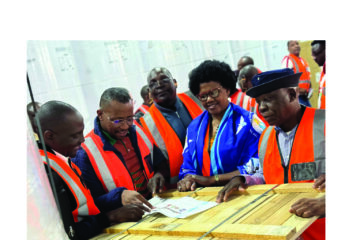Renthia Kaimbi
Namibia has appealed for international help to restock critical malaria medicines as the country faces a worsening outbreak and dangerously low drug supplies.
A letter obtained by the Windhoek Observer revealed that Health Minister Dr Esperance Luvindao had reached out to diplomatic missions for assistance after the national medical warehouse was found to have only a one-month supply of essential antimalarial drugs.
The Windhoek Observer understands that a formal request was sent to Japan’s ambassador to Namibia, Asazuma Shinichi. However, it remains unclear if similar appeals were made to other embassies.
“Today, I reach out to you regarding a pressing public health concern that threatens the health and well-being of the Namibian people. Namibia experienced a malaria outbreak from December 2024 to June 2025 whereby malaria cases increased significantly in all malaria-endemic regions, affecting all population groups,” reads Luvindao’s letter to the ambassador.
The appeal comes amid a nationwide malaria outbreak that has pushed all endemic regions beyond epidemic thresholds.
In August, the Ministry of Health reported that a total of 154 people had died from malaria over an eight-month period.
The number of deaths had risen from 50 in 2024 to 154 in 2025, bringing the total to 204 malaria-related deaths over two years. Namibia had declared a malaria outbreak on 23 December 2024, which mainly affects the northern regions of the country.
Since January, Namibia has recorded 93 801 confirmed malaria cases and 8 604 hospital admissions.
Luvindao described malaria transmission as moderate, highly seasonal, and unstable, with recurring outbreaks since 2014.
The hardest-hit regions are Kavango East, Kavango West, Zambezi, Ohangwena, and Oshikoto, which together account for more than 80% of reported cases.
“The exacerbating factors include climatic conditions, insecticide resistance, drug resistance, inadequate intervention coverage and sub-optimal quality of interventions along with challenges related to logistics and commodities,” the letter stated.
The ministry had activated its incident management system from December 2024 to June 2025 to manage the crisis.
The response included case management, community mobilisation, reactive indoor residual spraying, larviciding and the distribution of long-lasting insecticidal nets.
However, officials warned that the situation could worsen as forecasts predict moderate to heavy rains during the next malaria season, from December 2025 to April 2026.
The ministry previously said a further surge in cases could strain already limited resources.
In her appeal, Luvindao requested Japan’s assistance to close the supply gap for essential malaria commodities, including primaquine, artemether-lumefantrine, injectable artesunate, mosquito nets, and temophos.
She also asked for technical support in strengthening vector resistance surveillance, therapeutic efficacy testing and monitoring of antimalarial drugs.
“It would be grateful for your support and collaboration in the fight against malaria in Namibia,” she wrote. The letter directs follow-up enquiries to the ministry’s executive director, Penda Ithindi.
Concerns over medicine quality
Sources within the ministry, however, said the issue extends beyond availability, stressing that the medicines obtained through donations or procurement must be “fit for purpose.”
They questioned whether the minister consulted the Namibia Medicines Regulatory Council (NMRC) to confirm that the drugs requested meet national safety, quality and efficacy standards.
“Are the malaria medicines she requested World Health Organization prequalified to ensure that the medicines they import, especially through international aid, will work as intended and not harm patients?” one source asked.
However, MoHSS public relations officer Walters Kamaya rejected claims of shortages.
He said the ministry’s pharmaceutical department confirmed that sufficient stock remains in the Central Medical Stores.
“I was told that we have 95% of our supplies at our CMS department. Help us to indicate what type of medicine is out of stock. It’s not to say that we don’t have medicine; it’s not true. We have more than 1 200 line items or commodities. To say we have a shortage of medicine? No, it can’t be,” Kamaya told the Windhoek Observer.
Last month, the Ministry of Health stopped using middlemen in the procurement of medicines and clinical supplies, opting to purchase directly from manufacturers and international wholesalers.
Luvindao said the change had already saved the government more than N$221 million in its first phase.
President Netumbo Nandi-Ndaitwah supported the move and said the savings will be reinvested into improving public health services.




